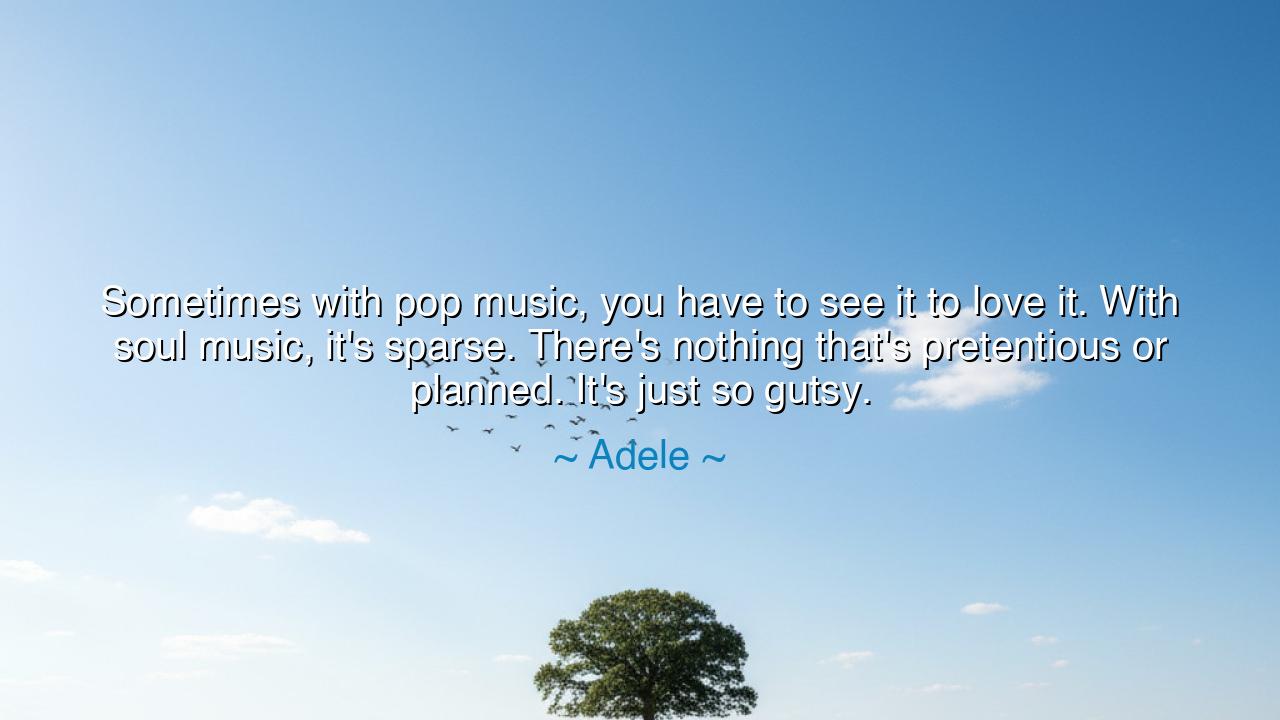
Sometimes with pop music, you have to see it to love it. With
Sometimes with pop music, you have to see it to love it. With soul music, it's sparse. There's nothing that's pretentious or planned. It's just so gutsy.






When Adele declared, “Sometimes with pop music, you have to see it to love it. With soul music, it’s sparse. There’s nothing that’s pretentious or planned. It’s just so gutsy,” she spoke as one who has walked between two worlds: the world of spectacle and the world of spirit. Her words draw a distinction between pop music, which often dazzles with image, production, and performance, and soul music, which pierces the heart by its very rawness. She reminds us that true power in music is not found in elaborate show, but in the gutsy honesty of the human voice and the stripped-down truth of lived experience.
The ancients themselves knew this divide. In the courts of kings, musicians adorned their songs with ornament and spectacle, for they performed for eyes as much as ears. But in the fields, at the fires, and in the temples, people sang simply—voices lifted unadorned, bearing the raw cry of joy, grief, or hope. The difference Adele speaks of is as old as music itself: one form enchants through appearance, the other through essence. To see pop is often to be persuaded; to hear soul is to be moved.
Her words also reveal a warning against pretension. When music becomes too carefully planned, when every gesture is calculated for effect, the spirit is often lost. Soul music, as Adele describes it, lives in the moment, born not of perfection but of passion. It is “sparse,” not empty, but stripped of excess, so that only the truth remains. This is why the greatest soul singers—Aretha Franklin, Otis Redding, Sam Cooke—still move hearts across generations. Their songs are not performances, but confessions, cries, and offerings.
History gives us an echo in the story of the blues, born out of suffering in the American South. These songs did not come with costumes or choreography; they were the raw voice of pain and endurance. No stagecraft was needed, for the power lay in the honesty of the sound itself. Those who heard it knew instantly that it was not spectacle, but truth. Adele’s reverence for soul stands in this lineage: music that is gutsy, unmasked, and unforgettable.
There is also humility in her confession. Adele herself has sung pop hits, yet she points to soul music as the form that holds the deeper, timeless essence. She reminds us that even the artist, amidst fame and spectacle, must look inward and ask: “Am I singing for the eyes, or for the heart?” It is a call for authenticity, for music that is not designed to impress, but to express.
The lesson for us is clear: in all forms of expression—whether art, work, or life—strip away the unnecessary and seek the soul of the matter. Do not become entangled in appearances, for they fade quickly. Instead, let your work, your words, and your life be “sparse” in pretension and “gutsy” in honesty. It is better to be raw and real than polished and hollow.
Practically, this means daring to speak truth without dressing it in excess. If you are an artist, let your creation bear your own heart, not merely the expectations of others. If you are a leader, let your words be plain and direct, not decorated with empty promises. If you are a friend, show honesty rather than performance. For in every sphere, what touches people most deeply is not spectacle, but sincerity.
Thus, Adele’s words shine with ancient wisdom: pop may dazzle the eye, but soul feeds the spirit. And so the teaching is this: let your life be like soul music—unpretentious, unplanned, and gutsy, carrying the raw honesty of who you are. For it is this truth, sparse and fearless, that will endure long after the spectacle has faded.






AAdministratorAdministrator
Welcome, honored guests. Please leave a comment, we will respond soon